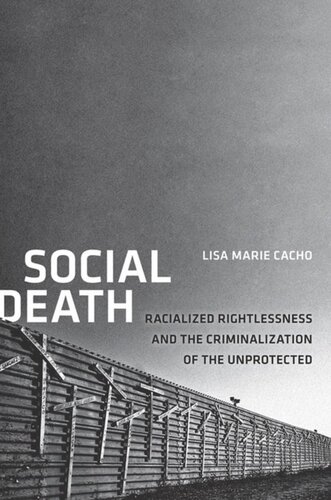

Most ebook files are in PDF format, so you can easily read them using various software such as Foxit Reader or directly on the Google Chrome browser.
Some ebook files are released by publishers in other formats such as .awz, .mobi, .epub, .fb2, etc. You may need to install specific software to read these formats on mobile/PC, such as Calibre.
Please read the tutorial at this link: https://ebookbell.com/faq
We offer FREE conversion to the popular formats you request; however, this may take some time. Therefore, right after payment, please email us, and we will try to provide the service as quickly as possible.
For some exceptional file formats or broken links (if any), please refrain from opening any disputes. Instead, email us first, and we will try to assist within a maximum of 6 hours.
EbookBell Team

5.0
18 reviewsWinner of the 2013 John Hope Franklin Book Prize presented by the American Studies Association
Social Death tackles one of the core paradoxes of social justice struggles and scholarship—that the battle to end oppression shares the moral grammar that structures exploitation and sanctions state violence. Lisa Marie Cacho forcefully argues that the demands for personhood for those who, in the eyes of society, have little value, depend on capitalist and heteropatriarchal measures of worth.
With poignant case studies, Cacho illustrates that our very understanding of personhood is premised upon the unchallenged devaluation of criminalized populations of color. Hence, the reliance of rights-based politics on notions of who is and is not a deserving member of society inadvertently replicates the logic that creates and normalizes states of social and literal death. Her understanding of inalienable rights and personhood provides us the much-needed comparative analytical and ethical tools to understand the racialized and nationalized tensions between racial groups. Driven by a radical, relentless critique, Social Death challenges us to imagine a heretofore “unthinkable” politics and ethics that do not rest on neoliberal arguments about worth, but rather emerge from the insurgent experiences of those negated persons who do not live by the norms that determine the productive, patriotic, law abiding, and family-oriented subject.
Winner of the 2013 John Hope Franklin Book Prize presented by the American Studies Association
Social Death tackles one of the core paradoxes of social justice struggles and scholarship—that the battle to end oppression shares the moral grammar that structures exploitation and sanctions state violence. Lisa Marie Cacho forcefully argues that the demands for personhood for those who, in the eyes of society, have little value, depend on capitalist and heteropatriarchal measures of worth.
With poignant case studies, Cacho illustrates that our very understanding of personhood is premised upon the unchallenged devaluation of criminalized populations of color. Hence, the reliance of rights-based politics on notions of who is and is not a deserving member of society inadvertently replicates the logic that creates and normalizes states of social and literal death. Her understanding of inalienable rights and personhood provides us the much-needed comparative analytical and ethical tools to understand the racialized and nationalized tensions between racial groups. Driven by a radical, relentless critique, Social Death challenges us to imagine a heretofore “unthinkable” politics and ethics that do not rest on neoliberal arguments about worth, but rather emerge from the insurgent experiences of those negated persons who do not live by the norms that determine the productive, patriotic, law abiding, and family-oriented subject.